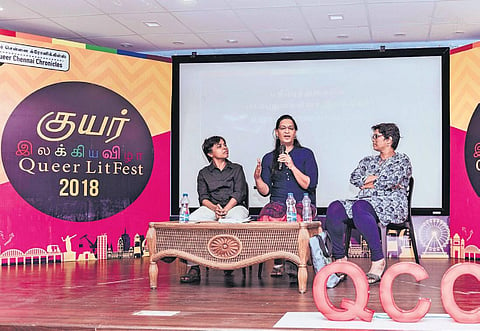

CHENNAI: It’s been six months and the pandemic’s destructive capacity remains undisputed. But, many of us have had reason to be grudgingly grateful. This time around, it’s the Queer Chronicles that is joining this gratitude list. For it was this unprecedented hiccup that allowed it to move the third edition of the Chennai Queer LitFest online, promising a wider reach than ever before. Coming off from the discourse on the importance of inclusivity in children’s literature in the second edition of the festival, this year around, it plans to delve into the power of storytelling.
Besides the oft-discussed forms of writing and poetry, the festival intends to focus on different ways of storytelling — be it through stand-up comedy, a dance performance, or oral storytelling. Going beyond these forms, the curated sessions will also look at who the stories are meant for. “We’ll look at how queer performers perform not necessarily for just queer audiences but also the mainstream one. The focus will also be on packaging the content in a very queer-friendly and feminist-friendly perspective,” explains Moulee, festival director and curator.
Going global
Towards this end, the team has 10 speakers and eight sessions lined up over two weekends this month. Moving online has offered the festival the freedom to go international, bringing in Tamil speakers from outside the country to offer their perspective and share their wealth of experience. There’s Sunthar V, writer and comic — a Tamil-Canadian settled in the United Kingdom; writer and polyglot Martin Frank from Switzerland; spoken word artist and queer rights activist Florian Niederseer from Austria; and Yalini Dream, Sri Lankan Tamil performing artist based out of the USA. Joining them from within the country are theatre artist, writer and transgender rights activist Living Smile Vidya; Priyadharsini, journalist, filmmaker and founder of The Blue Club; Kirthi Jayakumar, founder of The Gender Security Project; and Pune-based comedian Ayushi Jagad.
“These are the voices we wanted to hear. They are performers, they are Tamil, and they are queer. It (moving online) provides us with the opportunity to engage with them and bring their perspective to Tamil-speaking people — not just in India but around the globe. Having the festival online also gives us a different audience. Earlier, it was only people in Chennai or who could travel here. Now, it’s open to everyone,” points out Moulee.
This plays well with the team’s firm belief that art from the queer world is for everyone. “Something we’ve been very clear from the first year is that one, we want to highlight LGBT writers, translators and artists. We also want to show that this literature or performances are not just for queer people; there’s something for everyone. It’s also to highlight that you cannot box us within a certain space or genre and say that this is only for these audiences. This is an enriching narrative that we have; we want to show what others are missing out. That is something we’ve been trying to highlight every year. Even last year, we had inclusive children’s literature. It was not specific to LGBT but about how we can overcome gender stereotypes that are being fed to children, or how we talk about children from different backgrounds,” he recounts.
Priyadharsini recalls that the intended audience for the first edition of the festival had been the queer community. Now, it has a better reach. “In India, people think that these issues are meant only for the queer community. The way they see caste issues as only meant for the oppressed castes. The festival has grown much beyond that,” she adds.
Opening avenues
What’s equally important is the narrative around the success of queer people and their work. At a time when the achievements of people in the LGBTQ+ community is often reduced to their identity (or rather a part of it), it is important to see who sets the standards for this success, suggests Moulee. “That in such an unfriendly environment or inequitable status, people are achieving is something we need to highlight. But at the same time, this achievement shouldn’t be shunned to a certain identity, saying it is not on par with the mainstream. Yet, we also need to look at what becomes the standard of achievement and who sets it. If there are ten books and nine are by men, do we take the standard from the majority and say this is how the rest of the books are to be? That conversation should also happen,” he offers.
Chipping in, Priyadharsini suggests that it’s a result of the way society is organised. “In the end, one particular problem becomes the problem of that community or people from certain backgrounds. But if you look at it, it’s the problem of the society, right? None of the issues we are facing today exist in package or separate boxes. The tag that this person is from a particular community, or gender background or sexual orientation, that becomes an issue. But, in a way, it also works towards representation,” she suggests.
After being associated with the festival since its debut, Priyadharsini is set to host an interactive workshop that would talk about digital media as a platform for advocacy for marginalised women and queer people. Besides that, there’s a whole spectrum of events in store. The festival will, as usual, have literature readings from the community as well.